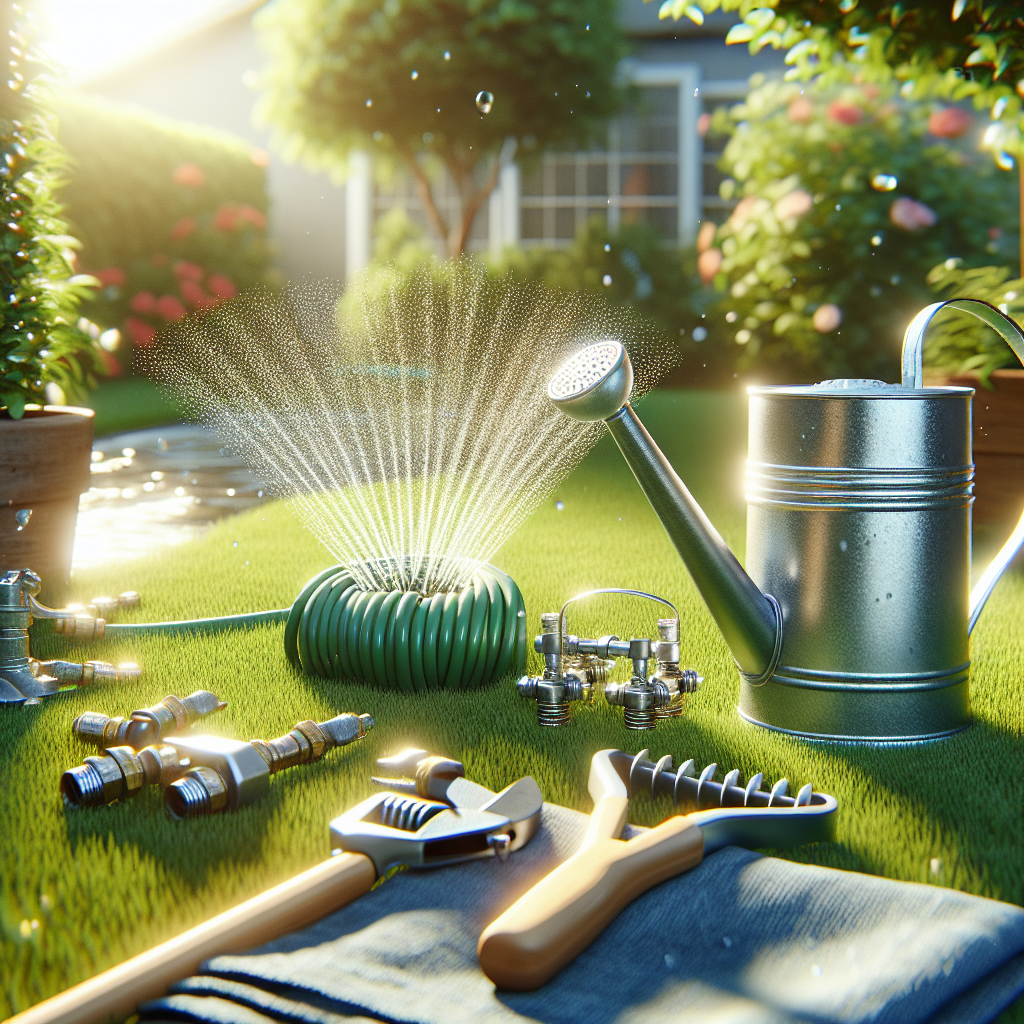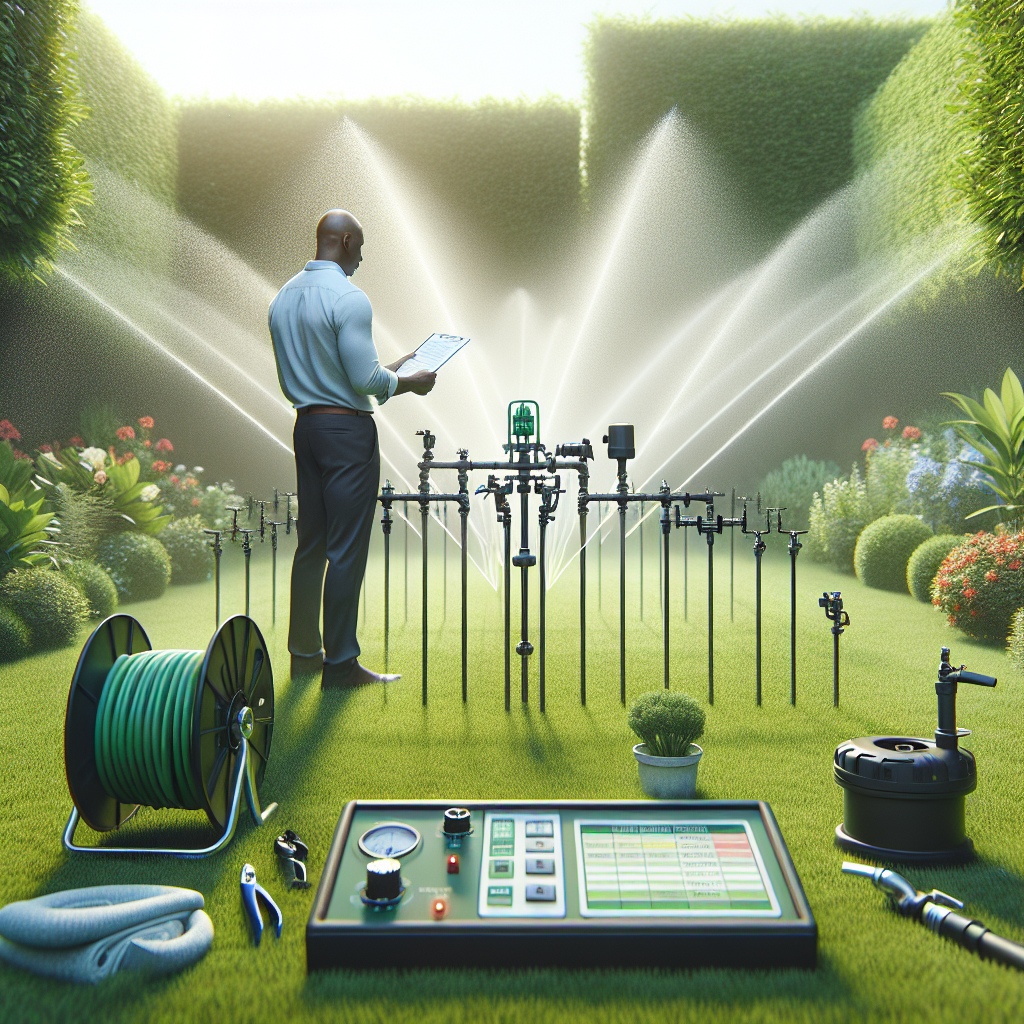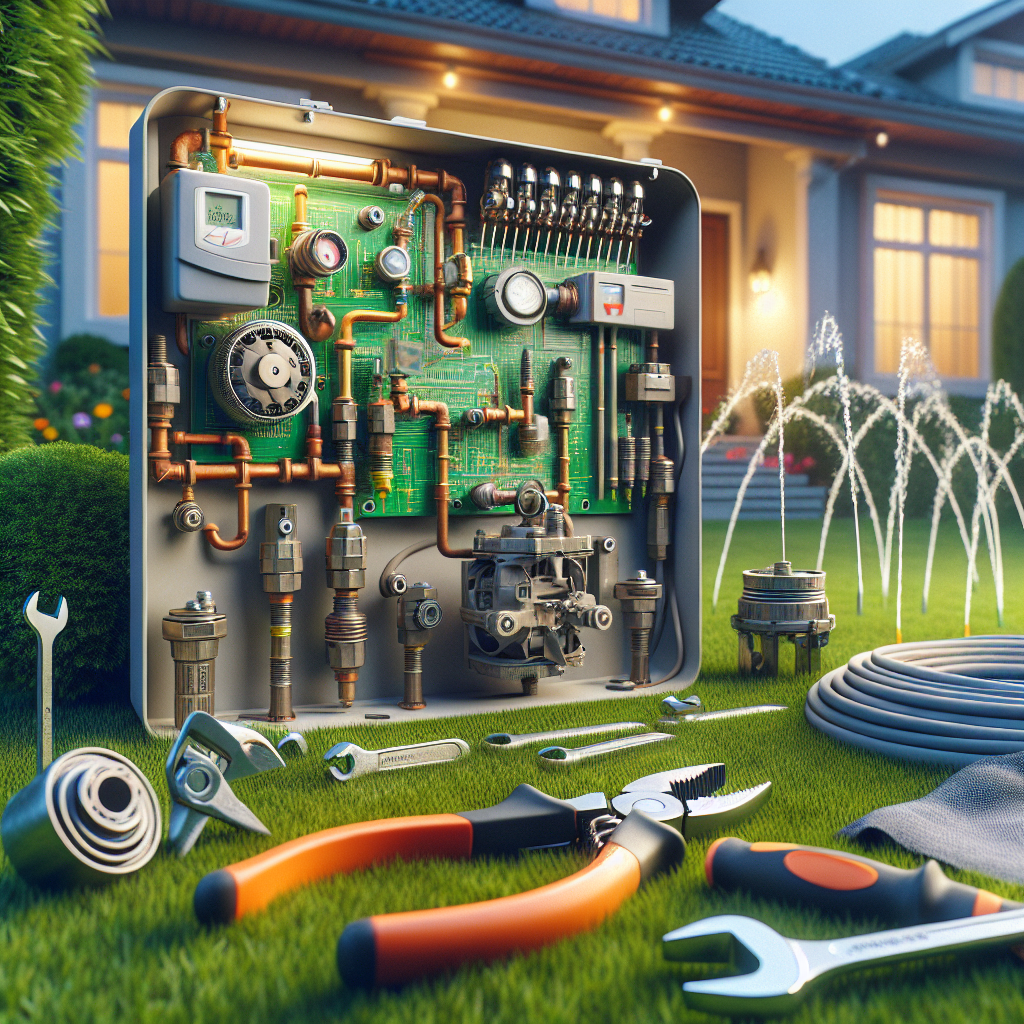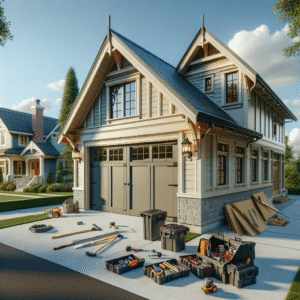Whether you are nurturing a lush green lawn or cultivating a home garden, maintaining an efficient irrigation system is key to keeping your landscape vibrant and healthy. But what exactly involves home irrigation maintenance? From understanding the various types of systems to performing regular check-ups, this guide offers a comprehensive look into keeping your system in top shape, ensuring your green spaces remain flourishing.
Understanding the Basics of Home Irrigation Systems
Before diving into maintenance, it’s crucial to grasp the fundamentals of home irrigation systems. These systems are designed to deliver water to your landscape efficiently and effectively. Let’s break down the essentials:
Types of Home Irrigation Systems
- Sprinkler Systems: Ideal for covering large areas of grass and garden.
- Drip Irrigation: Provides slow, steady water directly to the plant roots, minimizing wastage.
- Soaker Hoses: Simple, porous hoses that deliver water directly to the soil surface.
Components of an Irrigation System
- Controllers: The brain of the system, setting the timing and amount of watering.
- Valves: Control the flow of water to different zones of your garden.
- Pipes and Sprinklers: Distribute water across your landscape.
The Importance of Regular Maintenance
Regular maintenance ensures your irrigation system operates at its best, conserving water and reducing costs. It also prevents common issues like leaks or blockages that can lead to uneven watering or damaged plants.
Step-by-Step Guide to Maintaining Your Irrigation System
Keeping your irrigation system well-maintained doesn’t have to be daunting. Here are essential maintenance tips to keep your system efficient year-round:
Monthly Maintenance Tasks
- Inspect and clean filters to prevent clogging.
- Check sprinkler heads for damage and proper operation.
- Adjust sprinkler heads to ensure optimal coverage and to prevent watering non-target areas like sidewalks or driveways.
Seasonal Adjustments and Checks
As the seasons change, so will the needs of your landscape. Adjust the watering schedule accordingly and prepare your system for winter by draining all water to prevent pipe bursts.
How to Identify and Troubleshoot Common Issues
Common issues such as uneven watering, leaking valves, or malfunctioning controllers can often be detected during regular inspections. Learning to troubleshoot these can save you time and keep your system running smoothly.
Professional Maintenance and When to Hire an Expert
While DIY maintenance is sufficient for basic upkeeps, professional help may be necessary for more complex issues or system upgrades. Here’s how to make the best use of professional services:
Benefits of Professional Irrigation Maintenance
Professionals can offer deep system audits, optimize water usage, and extend the lifespan of your irrigation system through expert care and advanced techniques.
How to Choose the Right Irrigation Maintenance Service
Select a service with good reviews, transparent pricing, and sufficient expertise in handling systems similar to yours. Local services are preferable as they understand the regional climate and its impact on irrigation needs.
What to Expect During a Professional Irrigation System Check-Up
Expect comprehensive system testing, from pressure checks to controller settings adjustments. Professionals should also provide detailed feedback and action items to maintain your system’s health.

If you’re ready to take your home improvement or construction project to the next level, we can help! Find trusted contractors on BuildNet, whether you’re looking for renovations, new builds, electrical work, plumbing, or anything in between. Our directory connects you with qualified professionals who can make your vision a reality.
Understanding the Basics of Home Irrigation Systems
Welcome to the world of home irrigation! Whether you’re a budding gardener, an eco-friendly homeowner, or just looking to keep your lawn lush and green, understanding your home irrigation system is key. Let’s dive into what makes these systems tick, why they’re so crucial, and how taking care of them can save you a lot of headache (and water) down the road.
Types of Home Irrigation Systems
First things first, let’s talk about the different types of irrigation systems available. Each type has its own set of benefits and is suited best for certain types of landscapes and uses:
- Drip Irrigation: Perfect for conserving water, drip irrigation delivers water directly to the base of your plants slowly and steadily. It’s ideal for gardens, dense planting areas, and can even be used for hedges and row crops.
- Sprinkler Systems: These are fantastic for covering large areas like lawns. They can be customized with different types of sprinkler heads to suit the watering needs of specific zones within your yard.
- Soaker Hoses: Similar to drip irrigation, soaker hoses allow water to seep out all along the hose. They are excellent for flower beds and vegetable patches.
- Automatic/Sensor-based Systems: Using sensors and timers, these smart systems optimize water usage based on the climate and the soil moisture levels. They take a lot of the guesswork and manual effort out of irrigation.
Each system has its merits, so consider your garden’s needs, your water conservation goals, and budget when choosing the right one.
Components of an Irrigation System
Knowing the components of your irrigation system helps in understanding how it works and what may need attention during routine checks. Here are the essential parts:
- Controller/Timer: The brain of the operation, this device sets the timing and duration of watering. Modern controllers can be programmed to vary schedules based on weather conditions.
- Valves: These regulate the flow of water to different zones or sections of your yard. Each valve is typically responsible for a specific area.
- Pipes: Pipes transport water from your main supply to different parts of your garden. They need to be durable and leak-free to maintain efficient water flow.
- Sprinkler Heads and Drippers: These are the outlets from which water is actually emitted. Their correct placement ensures even coverage and efficient watering.
- Sensors: In advanced systems, sensors help monitor moisture levels, preventing overwatering and under watering.
Understanding these components and their function within your irrigation system can dramatically improve your ability to maintain it effectively.
The Importance of Regular Maintenance
Regular maintenance is not just about preventing malfunctions or prolonging the life of your irrigation system; it’s also about conservation and efficiency. Here’s why regular checks and balances are essential:
- Water Conservation: Leaks and overwatering are not just harmful to your plants, but they waste a valuable resource. Regular maintenance ensures that your system uses water as efficiently as possible.
- Cost-Effective: Preventative maintenance can save you money in the long run by avoiding costly repairs or complete overhauls due to negligence.
- Plant Health: Properly maintained irrigation systems provide just the right amount of water needed by plants, which is crucial for their growth and health.
- Value Addition: A well-maintained landscape enhances the aesthetic appeal and value of your property.
In essence, taking the time to understand and maintain your home irrigation system can lead to significant benefits, both financially and environmentally. Whether you’re a novice gardener or a seasoned green thumb, a well-maintained irrigation system will support your gardening endeavors and help you achieve that lush, inviting landscape you’ve always wanted.

Step-by-Step Guide to Maintaining Your Irrigation System
Maintaining your home irrigation system is essential not just for keeping your garden thriving but also for saving water and avoiding costly repairs. Here’s a friendly guide to help you keep your system in top shape month by month and across seasons. Whether you’re a seasoned green thumb or a newbie to gardening, these tips will ensure you can handle the basics of irrigation maintenance with confidence.
Monthly Maintenance Tasks
Regular checks and minor tweaks can prevent major issues from cropping up. Here’s what you can do every month to keep your irrigation system running smoothly:
- Inspect the Controller: Start with the brain of the operation – the irrigation controller. Ensure it’s programmed correctly for the current season and that the backup battery is in good condition. This is a good time to adjust the watering schedule as the seasonal weather shifts.
- Check for Leaks: Walk through your property and check for any signs of leakage. Look for unusually wet areas in the landscape or dripping valves, as leaks can be a major water waster and can damage plant roots.
- Clean Sprinkler Heads: Clean any dirt or debris from the sprinkler heads. Blocked heads can affect the water distribution, leading to dry spots or water logging in your garden.
- Test Spray Patterns: Turn on each zone one at a time and observe the spray patterns. Adjust any heads that are spraying buildings, sidewalks, or roads to ensure water is used efficiently on the landscape.
Seasonal Adjustments and Checks
As the seasons change, your irrigation needs will change too. Here’s how you can adapt your system to ensure optimal performance:
- Spring Tune-Up: In early spring, before the main gardening season kicks off, give your system a thorough check. Replace any damaged parts, check for wear and tear on valves and pipes, and make sure the system pressure is optimal.
- Summer Monitoring: Summer might require more frequent checks, especially if temperatures soar. Watch for signs of over-watering like soggy ground or fungal growth, and under-watering such as brown patches of grass.
- Fall Preparation: Reduce the watering schedule as temperatures drop and prepare the system for winter. In areas with freezing temperatures, this might include draining the system to prevent pipe bursts.
- Winter Shutdown: If your area experiences a freeze, it’s crucial to shut down the system entirely. Clean and inspect all components and store sensitive parts indoors if necessary.
How to Identify and Troubleshoot Common Issues
Even with regular maintenance, issues can pop up. Here’s how to troubleshoot some common irrigation problems:
- Uneven Watering: If you notice dry areas or pooling water, the issue might be with the sprinkler heads. Check for clogs, misalignment, or damage and adjust or replace as needed.
- System Won’t Turn On: This could be due to a power issue, a problem with the controller, or faulty wiring. Check the controller settings and connections first, then look at the valves and wiring if necessary.
- Poor Water Pressure: Low pressure can lead to poor water coverage. This might be a problem with the water source, a leak somewhere in the system, or clogged filters and pipes. Isolating this problem can sometimes be tricky, so consider contacting a professional if you’re unable to determine the cause.
- Valves Leaking or Not Closing: Sticky valves can waste water and harm your plants. This often requires cleaning the valves or solenoids, or in some cases, replacing them.
Regular maintenance is the key to the longevity and efficiency of your irrigation system. By following this monthly and seasonal care schedule, you’ll not only save water and money but also enjoy a healthier and more beautiful garden. Don’t be afraid to get your hands a little dirty – your plants will thank you for it!
Professional Maintenance and When to Hire an Expert
When it comes to keeping your home irrigation system in top shape, there’s a time to DIY and a time to call in the pros. Knowing when to hire an expert can save you not only time but also a lot of money in the long run by avoiding costly repairs due to improper maintenance. Let’s dive into the benefits of professional irrigation maintenance, how to select the right service, and what to expect during a routine check-up.
Benefits of Professional Irrigation Maintenance
Think of professional irrigation maintenance like a health check-up for your system. Here are some compelling reasons to consider going pro:
- Expertise and Experience: Professionals have the training and experience to spot issues that you might miss. They’re up to date with the latest technology and can optimize your system for efficiency and sustainability.
- Catching Problems Early: Regular professional check-ups can detect small problems before they become big, expensive ones. For instance, a small leak might not be noticeable but can escalate into a major issue if left unattended.
- System Longevity: Proper maintenance extends the life of your irrigation system, saving you from premature replacements and upgrades.
- Water Conservation: A well-maintained system uses water more efficiently, which is not only good for the planet but also for your water bills.
How to Choose the Right Irrigation Maintenance Service
Selecting the right professional service is crucial for ensuring that your irrigation system is in good hands. Here are some tips to help you make an informed decision:
- Check Credentials: Look for services that are licensed and insured. Certifications from industry organizations such as the Irrigation Association can also be a good indicator of reputable services.
- Read Reviews: Online reviews can provide insights into the reliability and quality of the service. Websites like Yelp, Google, and even local forums can be great resources.
- Ask for References: A trustworthy service will be happy to provide references. Talking to current and past customers can give you a sense of the service’s efficiency and customer satisfaction.
- Compare Estimates: Get quotes from multiple companies. This will not only help you understand the going rate for services but also give you a feel for what each service offers in their package.
What to Expect During a Professional Irrigation System Check-Up
When you hire a professional for an irrigation system maintenance check, they will typically cover several key steps. Here’s what usually happens:
- System Inspection: This includes checking the controller for proper operation, inspecting the valves, and ensuring the rain sensor is functioning, if applicable.
- Checking Sprinkler Heads: The technician will check each sprinkler head for proper operation, alignment, and coverage.
- Leak Detection: A thorough inspection to identify any leaks in the system. This includes checking for signs of soggy ground and inspecting the water meter for hidden leaks.
- Adjusting Controllers and Timers: Based on the current season and your landscape’s watering needs, the professional might adjust the watering schedule.
- Clean-Up: Any clogged nozzles and filter screens will be cleaned or replaced as needed.
- Report and Recommendations: At the end of the check-up, you should receive a detailed report outlining the health of your irrigation system and any recommendations for improvements or repairs.
Engaging a professional for your home irrigation system maintenance is not just about fixing problems. It’s about optimizing your system’s performance so you can save time, conserve water, and enjoy a beautifully maintained landscape. Remember, the best defense is a good offense, and with regular professional check-ups, your system will always be in top shape.

What are the Different Types of Home Irrigation Systems?
Home irrigation systems come in various types, each suited to different landscaping needs and water availability. The main types include:
- Drip Irrigation Systems: Ideal for conserving water, as it drips water slowly to the roots of plants.
- Sprinkler Systems: Covers large areas and can be customized to spray in any pattern that suits the landscape.
- Soaker Hoses: Good for garden beds, releasing water slowly through holes in the hose to saturate the soil.
- Rotary Systems: Rotating sprinkler heads ensure large and uniform area coverage, great for lawns.
What are the Key Components of an Irrigation System?
An irrigation system consists of several key components:
- Controller/Timer: The brain of the system, controlling when and how much water is released.
- Valves: Regulate water flow to different zones of the system.
- Sprinkler Heads and Drippers: Devices through which water is actually emitted.
- Pipes and Tubes: Transport water from the source to the sprinklers or drippers.
- Sensors: Optional components like rain or moisture sensors to optimize watering based on weather conditions.
Why is Regular Maintenance of an Irrigation System Important?
Regular maintenance ensures your irrigation system operates efficiently and conserves water. It helps prevent leaks, clogged lines, and ensures that water is distributed evenly across your garden. Additionally, maintenance can extend the lifespan of your system, saving you money on costly repairs or replacements.
What Monthly Maintenance Tasks are Critical for Irrigation Systems?
Monthly maintenance tasks for your irrigation system might include:
- Checking for leaks or signs of damage in pipes and sprinkler heads.
- Ensuring that all sprinkler heads are free from obstructions and aligned properly.
- Cleaning filters in drip lines and checking for proper water flow.
What Seasonal Adjustments Should Be Made to an Irrigation System?
As seasons change, your irrigation needs will also evolve:
- Spring: Check the system for any winter damage and start it up gradually.
- Summer: Adjust the watering schedule to account for increased temperatures and sunlight.
- Fall: Reduce watering frequency as temperatures drop and prepare the system for winter.
- Winter: If applicable, winterize the system to prevent freezing and damage.
How to Identify and Troubleshoot Common Irrigation Issues?
Common issues in irrigation systems include:
- Uneven Watering: Caused by clogged or misaligned sprinkler heads.
- Low Water Pressure: Check for leaks or blockages in the system.
- Control System Malfunctions: May need resetting or battery replacement.
What are the Benefits of Professional Irrigation Maintenance?
Professional maintenance provides peace of mind through expert care. Professionals can often diagnose and fix issues more efficiently and might provide warranties for their work. This ensures your system remains in top condition without you having to perform all the work yourself.
How to Choose the Right Irrigation Maintenance Service?
When selecting a professional irrigation service, consider:
- Local expertise and familiarity with regional climate and water needs.
- Licensing and insurance to ensure they’re qualified and covered.
- Reviews and references to gauge customer satisfaction.
What to Expect During a Professional Irrigation System Check-Up?
A professional check-up generally includes:
- Inspection of all system components for wear and damage.
- Adjustment of controller settings for optimal watering times.
- Replacement or repair of damaged parts.
- System performance report and recommendations for improvements.
Conclusion
Maintaining your home irrigation system is crucial for ensuring it operates efficiently and effectively. Whether you handle routine checks yourself or hire a professional, keeping your system in top shape will save you water and money in the long run. Remember, if you’re looking for reliable, local expertise, BuildNet has a directory of professional contractors ready to help. Don’t hesitate to visit our website and contact a contractor for a free quote today! Keeping your garden vibrant and your water bills low has never been easier!







